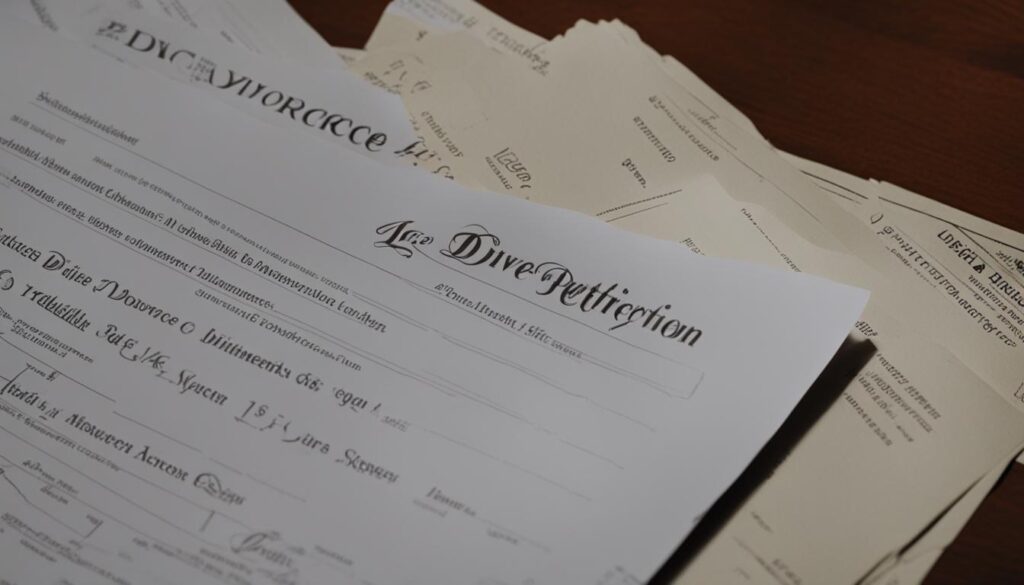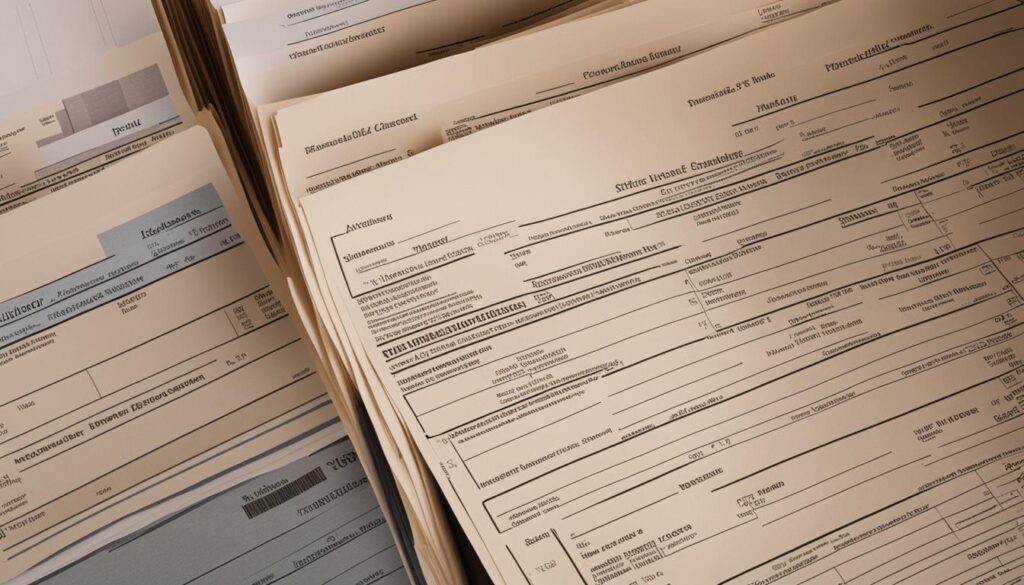Physical Address
304 North Cardinal St.
Dorchester Center, MA 02124
Physical Address
304 North Cardinal St.
Dorchester Center, MA 02124

Embarking on the process of filing for divorce in Tennessee can feel like venturing into the heart of the Smoky Mountains — it’s a path filled with both legal intricacies and emotional landscapes. Tennessee’s divorce laws carve out a unique journey, with specific rules and requirements that must be navigated with care.
Understanding residency requirements, deciphering complex legal documents, and managing the emotional trek are all part of this journey. But, you don’t have to walk this path alone. This article is like your trail guide, leading you through the hills and valleys of Tennessee’s divorce process.

We’ll break down the legal terminology and shed light on the emotional aspects of this path. Are you ready to take the first step towards a new chapter in the Volunteer State? Keep reading to learn about the essential steps for filing for divorce in Tennessee, and embark on this significant journey with knowledge and confidence.
For more on how to file for divorce, check out our article, How to File for Divorce: A Concise Guide for Couples.
In order to file for divorce in Tennessee, you must meet certain eligibility requirements.
One of the key requirements is that either you or your spouse must have lived in the state for at least six months prior to filing for divorce. This residency requirement ensures that you have a genuine connection to Tennessee and that the state has jurisdiction over your divorce case.
The residency requirement applies to both fault-based and no-fault divorces. Whether you’re filing for divorce based on irreconcilable differences or on fault grounds such as adultery or desertion, the six-month residency requirement must still be met.
To prove your eligibility for divorce in Tennessee, you will need to provide evidence of your residency. This can include documents such as lease agreements, utility bills, or driver’s licenses that show your address in Tennessee.
Make sure to gather and organize these documents before you begin the divorce process.
| Eligibility for Divorce in Tennessee | Residency Requirement |
|---|---|
| No-Fault Divorce | Either you or your spouse must have lived in Tennessee for at least six months prior to filing for divorce. |
| Fault-Based Divorce | Same as no-fault divorce—either you or your spouse must have lived in Tennessee for at least six months prior to filing for divorce. |
Next, let’s look at the grounds on which you can base your case. Tennessee recognizes both fault-based and no-fault grounds for divorce.
A no-fault divorce in Tennessee can be filed based on irreconcilable differences. This means that you and your spouse have experienced a breakdown in the marital relationship that cannot be repaired.
With a no-fault divorce, you do not need to prove any fault on either party and can simply state that there are irreconcilable differences. This is the most common ground for divorce in Tennessee.
Tennessee also recognizes fault grounds for divorce, which are based on specific actions or behaviors of one spouse that have led to the breakdown of the marriage.
Some examples of fault grounds for divorce in Tennessee include adultery, impotence, desertion, felony conviction, habitual drunkenness or drug abuse, cruelty, and inappropriate marital conduct.
If you choose to file for a fault-based divorce in Tennessee, you will need to provide evidence to support your claims. This may include witness testimonies, photographs, financial records, or other documentation.
You’ll want to consult with an experienced divorce attorney to understand the specific requirements for your case and to gather the necessary evidence to support your claims.
| No-Fault Divorce | Fault-Based Divorce |
|---|---|
| Based on irreconcilable differences | Based on specific actions or behaviors of one spouse |
| No need to prove fault | Requires providing evidence to support claims |
| Most common ground for divorce in Tennessee | May include adultery, impotence, desertion, felony conviction, cruelty, and more |

Going through a divorce can be emotionally challenging, but being prepared can make the process smoother. Before filing for divorce in Tennessee, take the time to gather all the necessary documents and information related to your assets, debts, and children.
This will help you navigate the divorce process and ensure that your rights and interests are protected.
Here are some key steps to consider when preparing for divorce:
In addition to gathering these documents, it may be beneficial to consult with a divorce attorney who can provide guidance on your specific situation. An attorney can help you understand your rights, navigate the divorce process, and ensure that all necessary paperwork is completed correctly.
By being prepared and having the necessary information at hand, you can help streamline the divorce process and work towards a resolution that is fair and in your best interest. Remember to prioritize self-care and seek support from friends, family, or a therapist during this challenging time.
When filing for divorce in Tennessee, you’ll need to prepare the necessary divorce forms. These forms are essential for initiating the legal process and ensuring that all relevant information is accurately documented.
To make the process smoother, the Tennessee State Courts website provides downloadable packets of forms for both situations with and without children. This ensures that you have access to the specific forms you need based on your unique circumstances.
Carefully fill out all required forms, ensuring that all information is accurate and complete. This includes providing details about your personal information, marriage, grounds for divorce, child custody, spousal support, and division of property and assets.
The divorce forms serve as a legal record of your intentions and will be used by the court to make decisions regarding your divorce settlement.
To avoid any potential errors or omissions, it may be helpful to seek assistance from a divorce attorney or a legal professional experienced in family law. They can guide you through the process, answer any questions you may have, and ensure that all necessary information is included in the forms.
By seeking professional guidance, you can have peace of mind knowing that your divorce forms are properly filled out and adhere to Tennessee’s legal requirements.
Filling out divorce forms can be a daunting task, but with the right resources and support, you can navigate the process smoothly.

You must file your forms in the county where either you or your spouse resides or where the grounds for divorce occurred. To find the correct county court, you can visit the website of the Tennessee State Courts.
When filing for divorce, note that the Tennessee county court handles divorce cases and will oversee the legal proceedings. Make sure to gather all necessary documents and forms, accurately fill them out, and submit them to the appropriate county court.
By following the correct procedures and submitting your forms to the correct location, you can begin the divorce process in Tennessee.
| County | Filing Fee | Address |
|---|---|---|
| Davidson County | $368 | 1 Public Square Nashville, TN 37201 |
| Shelby County | $378 | 140 Adams Ave Memphis, TN 38103 |
| Knox County | $360 | 400 Main St Knoxville, TN 37902 |
| Hamilton County | $366 | 625 Georgia Ave Chattanooga, TN 37402 |
Once you have completed all the necessary divorce forms, it’s time to file them with the court.
Filing divorce forms in Tennessee is a crucial step in initiating the divorce process. To ensure a smooth filing experience, it’s important to be aware of the requirements and procedures involved.
The first step is to gather all the completed forms and make copies for your records. Double-check that you have accurately filled out all the required fields and that you have included all necessary supporting documents, such as financial statements or parenting plans, if applicable.
Next, you will need to pay the filing fee. The divorce filing fee in Tennessee varies by county, so check the specific fee amount for your county.
If you are unable to afford the fee, you may be eligible to submit a Request to Postpone Filing Fees and Order, which can temporarily waive the fee.
Before submitting your divorce forms, use this checklist to ensure you have everything you need:
Once you have gathered all the necessary documents and paid the filing fee, you can submit your divorce forms to the court clerk. The court clerk will review your forms for completeness and may provide you with a case number or other relevant information.

Serving divorce papers, also known as the service of process, is the legal method of notifying your spouse that you have filed for divorce. This step is crucial as it ensures that your spouse is aware of the divorce proceedings and has the opportunity to respond.
In Tennessee, you have two options for serving divorce papers. The first option is to have your spouse waive the right to service by signing a marital settlement agreement. By doing so, your spouse acknowledges that they have received the divorce papers and waives the need for formal service. This option can expedite the process and save both time and money.
If your spouse does not waive service, you will need to hire a sheriff or process server to deliver the divorce papers personally. The server will provide proof of service, which is necessary for the court to proceed with the case.
If your spouse is out of state, you can send the papers through registered mail via the Secretary of State. Be sure to follow the proper procedure for serving divorce papers to ensure that your case moves forward smoothly.
| Serving Divorce Papers in Tennessee | Pros | Cons |
|---|---|---|
| Waiving Service of Process | Can expedite the process | Requires cooperation from spouse |
| Personal Service | Ensures legal compliance | May involve additional costs |
| Service via Registered Mail | Can be done when spouse is out of state | May require additional time |

If you have been served with a divorce petition in Tennessee, it’s important to understand your rights and options for responding to the petition. You have a specific period of time to file a response, so you’ll need to act promptly.
Here’s what you need to know about responding to a divorce petition in Tennessee:
Once you have been served with a divorce petition, you typically have 30 days to file a response in Tennessee.
Carefully review the petition and understand the allegations made by your spouse. You may want to consult with an attorney to help you navigate the process and ensure your rights are protected.
To respond to the divorce petition, you will need to file a written response with the court. This is typically called an Answer or Response to Petition.
In your response, you can admit or deny the allegations made by your spouse and raise any counterclaims or defenses you may have. Provide a clear and concise response that addresses each issue raised in the petition.
Responding to a divorce petition on your own can be done, but getting advice from a lawyer is a really good idea, especially when things are complicated.
A lawyer who knows a lot about divorce can explain your rights, help you write a detailed response, and lead you through the whole divorce process. They can also talk for you and make sure that what’s best for you is taken care of.
| Key Points | Details |
|---|---|
| Timeline | You typically have 30 days to file a response to a divorce petition in Tennessee. |
| Filing the Response | File a written response with the court, admitting or denying the allegations made by your spouse and addressing any counterclaims or defenses. |
| Legal Counsel | Consulting with an attorney can help you understand your rights, draft a comprehensive response, and navigate the divorce process. |

In a Tennessee divorce, both parties are required to disclose their financial information. These financial disclosures play a crucial role in determining matters such as spousal support, child support, and the division of property. Gather all relevant financial documents and provide accurate information during this process.
Financial disclosures typically include details about income, assets, and debts. This information helps the court assess each spouse’s financial situation and make fair decisions regarding support and property division.
Be thorough and honest when preparing these disclosures, as any attempts to hide assets or provide false information can have serious consequences.
To ensure the accuracy of your financial disclosures, gather documents such as bank statements, tax returns, pay stubs, investment statements, and mortgage or lease agreements.
Make sure to include information about any joint accounts, retirement savings, real estate, vehicles, and other assets. Additionally, provide details about outstanding debts such as mortgages, loans, credit card balances, and any other financial obligations.
| Common Financial Documents to Include | Purpose |
|---|---|
| Recent bank statements | To show income, expenses, and account balances |
| Tax returns (past few years) | To verify income and deductions |
| Pay stubs or income statements | To substantiate current income |
| Investment statements | To show stocks, bonds, retirement accounts, and other investments |
| Property deeds | To prove ownership of real estate |
| Vehicle titles | To establish ownership of vehicles |
| Credit card statements | To disclose outstanding balances and expenses |
| Loan documents | To provide details about outstanding debts |
Remember that financial disclosures are a legal requirement and failing to provide accurate and complete information can result in penalties or a negative impact on the outcome of your divorce settlement.
If you’re considering filing for divorce in Tennessee and prefer to handle the process on your own, you have the option of filing without an attorney. While it’s always recommended to seek legal advice, filing for divorce on your own is possible and can save you money on legal fees.
To begin the process, visit the Tennessee State Courts website, where you can find resources and forms for a DIY divorce. These forms will guide you through the necessary steps, such as stating the grounds for divorce, addressing child custody and support, and dividing property and assets.
To see how this process of filing for divorce in Tennessee compares to that in other states, check out our articles about how to file for divorce in Kentucky and filing for divorce in Mississippi.
You or your spouse must have lived in Tennessee for at least six months prior to filing for divorce, or the grounds for divorce must have occurred while you were living in Tennessee.
In Tennessee, you can file for a no-fault divorce based on irreconcilable differences. Tennessee also recognizes fault grounds for divorce, such as adultery, impotence, desertion, felony conviction, and more.
Yes, if you choose to file for a fault-based divorce, you will need to provide evidence to support your claims.
It is important to gather all necessary documents and information related to your assets, debts, and children. This includes financial records, property deeds, bank statements, and any relevant agreements or contracts.
You must file for divorce in the county where either you or your spouse resides, or where the grounds for divorce occurred.
Each county may have different filing fees, so make sure to check the specific requirements for your county.
Tennessee law requires you to notify your spouse when you file for divorce. Your spouse can waive the right to service of process by signing a marital settlement agreement. If your spouse does not waive service, you will need to hire a sheriff or process server to serve the divorce papers.
If you are the respondent in a divorce case in Tennessee, you have a certain period of time to respond to the divorce petition. It is important to consult with an attorney to understand your rights and options for responding to the petition and any issues raised in the divorce.
In a Tennessee divorce, both parties are required to disclose their financial information, including income, assets, and debts. This information is important for the court to determine spousal support, child support, and property division.
While it is recommended to consult with a divorce attorney, you can file for divorce without an attorney in Tennessee. The Tennessee court website provides resources and forms for DIY divorce.